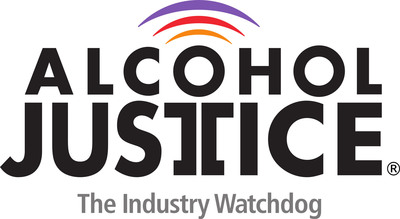SACRAMENTO, California, March 14, 2018 /PRNewswire-HISPANIC PR WIRE/ — Alcohol Justice and the California Alcohol Policy Alliance (CAPA) expressed disappointment as a majority of the California State Senate Governmental Organization Committee (GO) voted 8-2 at a March 13, 2018 hearing, allowing SB 905 to proceed. The bill was introduced by Senator Scott Wiener (D-San Francisco) and a number of co-authors including Senator Ricardo Lara (D-Bell Gardens).

At the hearing, opponents presented compelling, peer-reviewed data on harms and costs that would result from two additional hours of alcohol sales. Yet the committee seemed disinterested. The bill’s author attempted to discount it entirely while offering again his own meaningless, cherry-picked, disparate, numbers from federal sources.
Los Angeles City Councilmember Paul Koretz appeared and refuted Senator Wiener’s statement that Los Angeles had asked to be included in the bill’s list of cities that could apply for later last call. Koretz stated that he was against expanding alcohol sales to 4 a.m., and that the City Council had not been consulted and would probably not approve of it either.
Carson Benowitz-Fredericks, Research Manager at Alcohol Justice, summarized the existing evidence supporting how the acute effects of extending alcohol sales would spread to “Splash Zones” surrounding the six cities mentioned in the bill: Los Angeles, San Francisco, Sacramento, Oakland, Long Beach, and West Hollywood. He also commented that a true “pilot project” would cover a small sample, not the 76% of the state’s population that will be exposed to additional alcohol-related harms if SB 905 becomes law. He also stated that the bill did not contain any language detailing the collection or analysis of data, or even how to pay for this so-called “pilot project.”
In response to the author’s continued mischaracterization of SB 905 as a ‘local control’ measure, there is consensus among opponents that there is no such thing as local control in alcohol policy and that the harm from one city’s decision to change last-call times will “splash” over to every surrounding community.
Brenda Villanueva, Prevention Coordinator of Pueblo y Salud and Co-chair of the Los Angeles Drug & Alcohol Policy Alliance testified that Southern California does not have reliable, late night transportation options across cities’ borders. She said “…the bill will cause early morning commuter backup for the inevitable 4:30 to 5:30 a.m. drunk driving collisions from the bar crawlers who have to leave the entertainment districts and go back to their city of origin.”
Brenda also offered a statement from Jonathan Fielding, M.D., M.P.H., M.A., M.B.A, Distinguished Professor UCLA Fielding School of Public Health and UCLA Geffen School of Medicine. Dr. Fielding was Chair of the U.S. Community Preventive Services Task Force which found in a peer-reviewed, global meta-analysis that every 2-hour increase in last-call times results in greater vehicle crash injuries and E.R. admissions. (Hahn et al., 2010) Dr. Fielding stated, “…I have no reason to believe that an increase in hours of sale anywhere in the U.S. would have different results.”
California currently suffers over 10,500 alcohol-related deaths and $34 billion in costs annually. The California Office of Traffic Safety has reported that fatal DUI is a chronic, worsening problem for the state. Between 2014 and 2016, alcohol-related crash deaths rose 21%. That number can only go with two additional hours of alcohol consumption. Thus, the only benefit of selling alcohol between 2 and 4 a.m. will be greater profits to bar, restaurant, and club owners in the party zones the bill will create. While the public and all levels of government will be forced to continue to cover the costs of cleaning up the mess that follows.
“It is profoundly disturbing that this committee will not even acknowledge the current annual catastrophe of alcohol-related harm in California,” stated Michael Scippa, Public Affairs Director for Alcohol Justice. “Instead, they approve a measure that will increase it. Not surprising really, as there is no other committee in the Senate so vulnerable to alcohol industry lobbying. The term GUI – Government Under the Influence — sadly fits them to a tee.”
According to the website followthemoney.org, California Senate GO Committee members who voted YES to approve Wiener’s poorly constructed and funded six city, 5-year experiment have taken a total of $727,802 in campaign contributions from beer, wine and spirits companies:
- Chairman Bill Dodd (D-Napa) — $217,957
- Cathleen Galgiani (D-Stockton) — $141,016
- Anthony Cannella (R-Ceres) — $86,372
- Anthony Portantino (D-La Canada Flintridge) — $84,488
- Ricardo Lara (D-Bell Gardens) — $62,171
- Jerry Hill (D-San Mateo) — $59,999
- Steven Glazer (D-Orinda) – $38,399
- Steven Bradford (D-Gardena) – $37,400
Two Senators voted NO: Ted Gaines (R-El Dorado Hills), Andy Vidak (R-Hanford)
Two Senators were absent: Tom Berryhill (R-Modesto), Ben Hueso (D-San Diego)
The bill now heads to the Senate Appropriations Committee where opponents would like to see the Governor’s State Budget and Accounting Department weigh-in. There is no language in SB 905 for additional funding for a true “pilot study” or for local enforcement or emergency services to deal with the projected increases in alcohol-related violence and traffic crashes after 4 a.m.
For more information or to TAKE ACTION, please visit AlcoholJustice.org.
|
CONTACT: |
Michael Scippa 415-548-0492 |
|
Jorge Castillo 213-840-3336 |
Logo – https://mma.prnewswire.com/media/147418/alcohol_justice_logo.jpg
SOURCE Alcohol Justice







